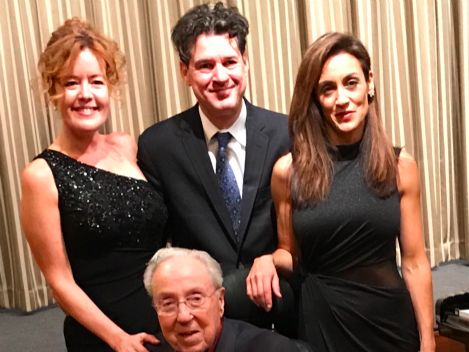|
Symphony
FROM THE NEW WORLD TO THE OLD WORLD
by Peter Lert
Saturday, June 14, 2025
Chamber
MC2 DUO RECITAL CLOSES 222'S SEASON
by Terry McNeill
Saturday, June 14, 2025
Choral and Vocal
CANTIAMO SONOMA'S LUSCIOUS A CAPELLA SINGING IN SEASON ENDING CONCERT
by Pamela Hicks Gailey
Sunday, June 8, 2025
Symphony
SRS SEASON ENDS WITH RESOUNDING TA-TA-TA-BANG
by Terry McNeill
Sunday, June 1, 2025
Symphony
YOUTHFUL VIRTUOSITY ON DISPLAY AT USO'S MAY CONCERTS
by Peter Lert
Saturday, May 17, 2025
Symphony
MYSTICAL PLANETS AND LIVELY GERSHWIN ORTIZ AT FINAL SRS CONCERT
by Peter Lert
Sunday, May 4, 2025
Symphony
VSO'S CONCERT MUSIC OF TIME, MUSIC OF PLACE
by Peter Lert
Sunday, April 27, 2025
VOCAL ELEGANCE AND FIRE AT THE 222'S RECITAL APRIL 26
by Pamela Hicks Gailey
Saturday, April 26, 2025
CANTIAMO SONOMA SINGS AN INSPIRED GOOD FRIDAY MOZART REQUIEM CONCERT
by Pamela Hicks Gailey
Friday, April 18, 2025
DRAMATIC SHOSTAKOVICH SYMPHONY CLOSES PHILHARMONIC'S 25TH SEASON
by Terry McNeill
Sunday, April 13, 2025
|
 |
 Lincoln Trio Nov. 7 at Spring Lake Village with Robert Hayden |
LUMINOUS FAURE TOPS LINCOLN TRIO'S SPRING LAKE VILLAGE CONCERT
by Terry McNeill
Wednesday, November 7, 2018
Familiarity in chamber music often evokes warm appreciation, and it was thus Nov. 7 when the Chicago-based Lincoln Piano Trio made one of their many Sonoma County appearances, this time on the Spring Lake Village Classical Music Series.
Regularly presented by local impresario Robert Hayden, the Lincoln played an abbreviated program of four works, beginning with a short “Silver Dagger”, composed for them by Stacy Garrop. Pianist Marta Asnavoorian’s tapping the strings from above started the short, atmospheric work that featured Desíree Ruhstrat’s violin line sliding in and out of notes in the high register, and cellist David Cunliff playing an often drone-like underpinning and a slow dissonant folk tune wound around pedal point piano phrase. Curiously the work didn’t sound contemporary.
Fauré’s D Minor Trio, Op. 120, followed, and though not contemporary it was at the first notes of the allegro full of softly swirling echt harmonies and rhythms that one knew it was the product the French master. Fine ensemble playing was heard and the Lincoln built the many small climaxes deftly, with often modulations seamlessly unfolding. Beautiful playing followed in the andantino where Ms. Asnavoorian played the cantando espressivo theme with charming grace and didn’t cover her colleagues. The Lincoln captured the yearning sad character of the movement.
Ms. Ruhstrat and Mr. Cunliffe dug into their strings in the finale allegro in an approach that was never jocular, but close. Urgency and wonderfully lively rhythmic breaks characterized the performance, with much spontaneous excitement that developed in the five-minute movement. A convincing Fauré performance demands a refined sensibility and an urbane sound, and the Lincoln delivered it.
Joaquin Turina’s early F Major Trio has been a Lincoln specialty, played and recorded far less than the Op. 35 and Op. 76 Turina Trios. The four-movement piece at times has reference to the two Arensky and other Russian Trios, and the playing in the opening lento – allegro had strong thematic projection in the march-like themes, and pedal point in the piano part. Slow descending passages characterized the andante, a beguiling threnody. Ms. Aznavoorian’s octave playing was forceful, and the big climax had a Spanish sound. Unison string playing was very good, often in the higher registers, and the lively scherzo with pizzicato strings was surprisingly lightweight.
Muscular and loud playing was heard in the concluding andante grandiose, a fast and impulsive romp that had echoes of the music of Franck and Bizet. Fauré chamber compositions masterfully combine throttled excitement with elegance, and the Lincoln conveyed these characteristics perfectly. Applause was generous but not loud.
A short and intense work by Juan Antonio Cuellar, a Colombian composer associated with the University of Indiana, closed then program. It was a jerky piece, menacing, dissonant and replete with repetitive phrases. A samba rhythm rolled in and the Lincoln gave the interpretation instrumental power and excitement. The specter of Gustavo Dudamel’s athletic conducting and musical juice came to mind.
On the next day the Lincoln Trio played a slightly expanded version of this program in the Music at Oakmont Series in Berger Auditorium.
|

